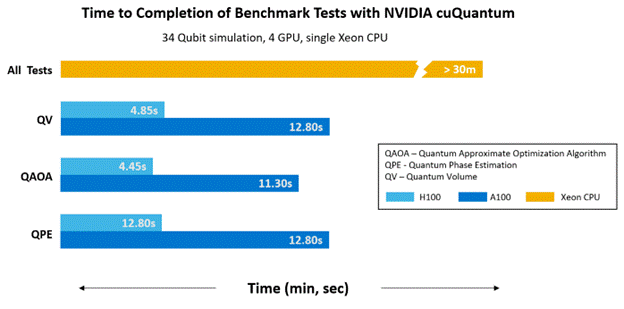GenAI is just one piece of a larger, accelerated compute puzzle. Quantum computing, a multidisciplinary field that utilizes quantum mechanics to solve complex problems, is another transformative technology with great promise. It has the potential to dramatically improve the process of finding optimal solutions across multiple domains, from novel drug development and financial analysis to supply chain and other emerging problems.
For businesses to harness this incredible potential, they must have the tools and environments to experiment with and develop quantum solutions. Hybrid quantum computing is an answer to that, linking elements of classical and quantum computing to deliver optimal solutions to complex problems.
In a recent collaboration with NVIDIA, Dell Technologies benchmarked and validated the power of its hybrid quantum computing platform, one built by combining the PowerEdge platform with NVIDIA H100 Tensor Core GPUs and NVIDIA cuQuantum.
Previously, by leveraging the PowerEdge R740xd paired with IonQ’s simulation engine and quantum processing unit (QPU), Dell Technologies demonstrated and made available a hybrid quantum platform.
At Dell Technologies, we understand that our customers want flexibility and options for their quantum computing journey. Through our collaboration with NVIDIA, we simplified this journey of discovery, identification and deployment, ensuring it can happen with as little friction as possible. The validation of the NVIDIA cuQuantum Appliance on PowerEdge servers further reaffirms this journey.
Dell Technologies’ hybrid quantum computing platform, powered by NVIDIA technology, represents a major extension to Dell Technologies’ abilities to provide hybrid quantum computing solutions to the market. Let’s take a deeper look at the components of this work and their role in enabling the quantum journey.
NVIDIA cuQuantum
NVIDIA cuQuantum is a tool designed to simulate quantum circuits at a large scale by providing a software development kit (SDK) of optimized libraries and tools that accelerate quantum computing workflows. Pushing the boundaries of what’s possible in quantum computing, cuQuantum offers several key advantages:
- Scalability. cuQuantum is designed to handle large-scale, complex quantum circuit simulations. This scalability is crucial as quantum computing continues to grow and evolve.
- Speed. Leveraging NVIDIA’s advanced GPU technology, cuQuantum delivers high performance, enabling faster and more efficient quantum simulations.
- Flexibility. cuQuantum is designed to work seamlessly with existing quantum software stacks, making it a versatile tool in any quantum computing toolkit.
Dell Technologies PowerEdge XE9680
On the other side of this powerful duo are the PowerEdge accelerated servers. Known for their reliability and performance, PowerEdge servers are the backbone of many data centers worldwide. Here’s why they’re an ideal match for NVIDIA cuQuantum:
- Reliability. PowerEdge servers are renowned for their reliability, providing the stable foundation needed for the demanding workloads of quantum simulations.
- Versatility. With a wide range of configurations, PowerEdge servers can be tailored to meet the specific needs of any quantum computing application.
- Global support. Dell Technologies’ global reach ensures users have broad access to support and services, minimizing downtime and keeping quantum simulations running smoothly.
More specifically, PowerEdge XE9680 servers are equipped with eight NVIDIA H100 or A100 Tensor Core SXM GPUs. This increases the ability to harness the incredible computational power in a 6RU footprint with large memory, CPU and storage capabilities, giving you the opportunity to quickly discover, identify and deploy quantum computing algorithms.
An example of this synergy can be seen in some of our latest benchmark test results. The benchmark tests were executed on systems running cuQuantum: a PowerEdge XE9680 using four of its eight H100 GPUs and a PowerEdge R740xd using its full complement of four A100 GPUs. The algorithms included quantum volume (QV), which is a pure quantum benchmark, the quantum approximate optimization algorithm (QAOA), typically used for optimization problems, and quantum phase estimation (QPE), a fundamental subroutine for chemistry and biology problems. Testing demonstrated the dramatic performance of the GPUs, with the A100 GPU configuration running 140x faster than on a single Xeon CPU and with the NVIDIA H100 running up to 400x faster.
Better Together
NVIDIA cuQuantum, combined with PowerEdge servers, creates a powerful platform for quantum computing. This combination allows researchers and businesses to explore the potential of quantum computing more effectively and efficiently.
The future of quantum computing looks bright, and it’s being shaped by foundational innovation taking place at this very moment. By coupling Dell Technologies’ foundational compute and storage capabilities with NVIDIA’s prowess in AI acceleration and software frameworks, organizations can be at the forefront, driving innovation and discovery in their sectors.
Source: dell.com






0 comments:
Post a Comment